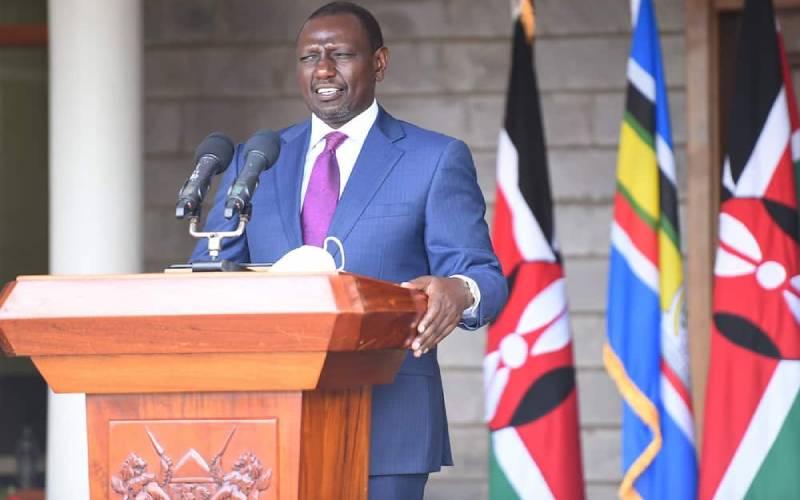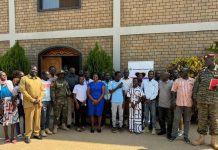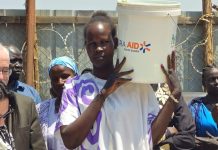Sheila Ponnie
Africa-Press – South-Sudan. Kenya now seems to be clutching at straws to avoid losing the South Sudanese imports that are on the brink of shifting to the Djibouti Port.
A weekend visit by the Kenyan president, William Ruto, unearthed the silent attempt by Nairobi to mend the possible cracks with Juba, which could see the latter change its importation route to the Horn of Africa, spelling an economic blow for Kenya.
After a meeting with President Salva Kiir in Juba, Ruto gave an expansive statement highlighting the content of their bilateral talk, part of which was the Lamu-South Sudan-Ethiopia Transport (LAPSET) corridor project, whose fate hangs in the balance.
The regional flagship project was designed to provide transport and logistics infrastructure, creating seamless connectivity between the Eastern African countries of Kenya, Ethiopia, and South Sudan. However, the idea has been gathering dust as member countries are yet to show full commitment to its completion.
Ruto said that his administration was on the final stretch of the construction, pending work from the South Sudan side.
“The road from Lamu to Garisa and on to Isiolo is being worked on and will be completed anytime so that we can connect our people for trade, business, and investment using the Lapset Corridor,” Ruto told journalists during the joint press briefing in Juba on Saturday.
He revealed that they had jointly instructed ministers and governors on the ground to hold an urgent meeting for them to complete the last section of the 365 km road, which will culminate in the Juba-Torit-Kapoeta-Nadapal single-carriageway.
On the other hand, Kiir said plans were afoot to engage the development partners to ensure Nadapal Road is connected to Torit and Juba to ease the movement of goods and people.
But it was not all about the ambitious LAPSSET project that may have alarmed the Nairobi administration enough to plan a Juba meeting.
President Kiir openly complained about Kenya’s trade policies, which he said had some impact on the South Sudanese economy.
“Any policy change on the Kenyan side regarding import clearance locations is frequently felt here in South Sudan on commodity prices,” said Kiir.
“Take, for example, the Naivasha Dry Port,” Kiir explained.
Ruto would then assure the media that he had directed that the clearing roles be returned to Mombasa rather than the Naivasha dry port because the latter was imposing additional costs on South Sudanese prices.
He also announced the removal of all trade barriers imposed by his country on South Sudan.
“We agreed that any policy changes in Kenya would have an impact on trade in South Sudan, so the Kenyan government has clarified its position on lifting trade restrictions,” stated Kiir.
“We have realigned our position so that South Sudan traders and business people must clear their goods in any part of Kenya, in Naivasha or Mombasa,” he added.
Salvaging ties
In September, South Sudanese authorities announced that they had purchased land on the coast of Djibouti, to build a port. Juba argued Djibouti would be more cost-effective as compared to Mombasa Port.
This was after the administration of Kenya’s former president, Uhuru Kenyatta, decided to relocate the clearance site for South Sudanese goods from Mombasa to Nairobi.
South Sudan said the land in Djibouti was critical for exporting the country’s crude oil, which currently passes through Sudan, as well as importing goods, the majority of which pass through Kenya’s port of Mombasa.
The country wanted to reduce its reliance on Mombasa Port after the clearance of South Sudan-bound cargo became uneasy following a change in Kenyan leadership.
The petroleum minister, Puot Kang Chol, said at the time that the land was purchased for the purpose of exporting crude oil.
“I would like to announce to all of you that as we have been pushing to ensure that we open all of our ways because, as we all know, South Sudan is a landlocked country, there is a need for us to try our level best to have access to the market,” he said.
Meanwhile, Uganda and the Democratic Republic of the Congo, recently said they would shift their port operations to Tanzania, leaving just Rwanda and Burundi still fully dependent on the port of Mombasa.
According to Duncan Otieno, a Nairobi-based economist, the move would put Kenya in a difficult position as it faces competition from the regional port in Dar es Salaam and now Djibouti.
Otieno contends that Juba’s attempt to reduce reliance on Mombasa, in particular, could have serious consequences for regional infrastructure.
“If there is a challenge that could have informed that, then perhaps it is an opportunity for President Ruto’s new regime to reach out to EAC members and reconsider that decision, because it runs the risk of undermining the LAPSET project, which has gulped in a lot of money.”
He added that, “every country is guided by its own national interests, which shift over time. However, this must be considered within the context of the EAC’s geopolitics. There is a need to consider this because it has the potential to harm the economy of this country.
South Sudan’s Economist Abraham Mamer, on the other hand, told The City Review months ago that the acquisition of land in Djibouti for the construction of a port has no bearing on the LAPSET project.
He explained that LAPSET connects South Sudan, Rwanda, and Uganda, and that the country cannot afford to lose this vital link.
“We are the best if we have many ways to import and export our goods.” We plan to construct a refinery where we will import and export our finished product.
Even though we have Djibouti, it is a way for us to import and export in order to maximise our impact in the region, which is why we are land linked.”
Kenya had previously given both South Sudan and Uganda land in Naivasha to facilitate the construction of a dry port, through which goods destined for Juba and Kampala would be cleared. This would save both countries from having to travel to Mombasa.
With the withdrawal of South Sudan, the Democratic Republic of the Congo, and Uganda, Otieno believes Kenya’s President should reconsider his decision.
“The fact that Uganda accounts for 83% of all cargo that passes through the port is not to be taken lightly, and should South Sudan follow suit, given that South Sudan is the second largest client, Rwanda will perish. “The Democratic Republic of the Congo and Uganda have decided to take the Dar es Salaam approach. So, it’s important for the regime to look critically on what could have triggered the exit.”
Abraham, on the other hand, believes that regional trade will benefit South Sudan, a landlocked country that relies on imports nearly 90 per cent of the time.
President Ruto now ordered all inbound cargo be cleared in Mombasa, effectively closing the Naivasha Inland Container Depot.
For More News And Analysis About South-Sudan Follow Africa-Press






